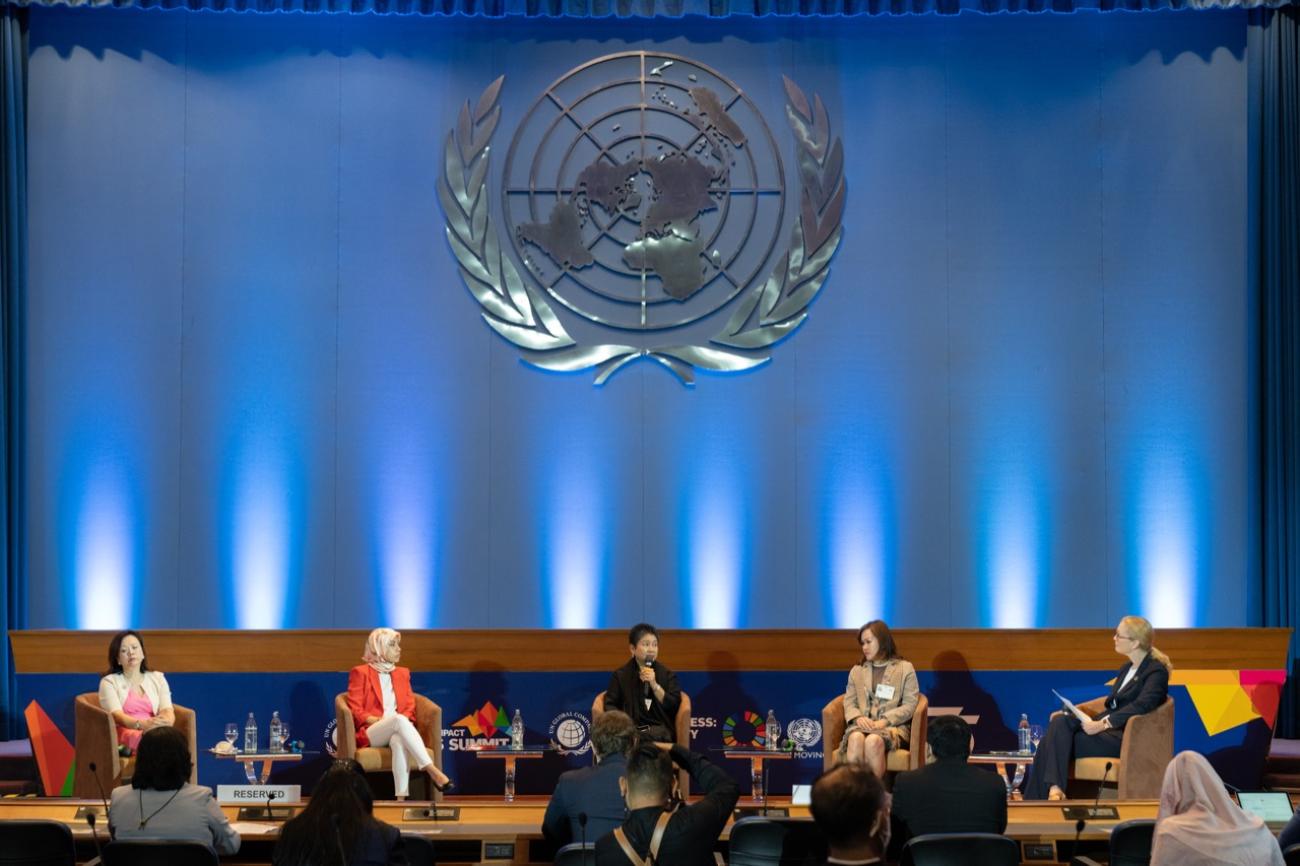Business leaders in Southeast Asia highlight 3 priorities for sustainability

ㅤ
- Global Compact Network Thailand (GCNT), together with the UN Economic and Social Commission for Asia and the Pacific (ESCAP) and the UN Country Team in Thailand have emphasized that empowering more business leaders will be key to achieving sustainability in Southeast Asia.
- 'Climate change', 'biodiversity' and 'inclusive social development' were the top priorities identified by the 'UNGC Leaders Summit 2022,' including the need for scale SMEs engagement locally with the Sustainable Development Goals (SDGs).
With over 10,000 attendees joining online and in-person, the 'UNGC Leaders Summit 2022: Sustainability in ASEAN' convened business leaders, civil society, governments, and the Global Compact Networks from Thailand, Indonesia, the Philippines, Singapore, Malaysia and Brunei. This year's #LeadersSummit builds on progress achieved in catalyzing local and regional solutions that aim at accelerating efforts towards the SDGs, in particular on climate action and the objectives of the Paris Agreement.
Sanda Ojiambo, Assistant Secretary-General and Chief Executive Officer of UN Global Compact, spoke about the challenges facing the world today: “Today the world is still struggling to emerge from the coronavirus pandemic – a battle that will only be won when vaccines reach everyone – and remedy the disruptions it has set off in the global economy. Earlier this year, the IPCC published its gloomiest report yet, warning that time is no longer on our side to prevent a climate change catastrophe. And on top of these disasters, the war in Ukraine is posing a direct systemic and persisting threat to global security on three fronts: food, energy and human. In times such as these, business is called upon to act. A reason for optimism is that we are seeing businesses taking action; providing solutions; forming coalitions of the willing. Nevertheless there is still more that needs to be done, particularly with regard to mobilizing the financing and investments required for delivery of the Sustainable Development Goals.”
Armida Salsiah Alisjahbana, Under-Secretary-General of the UN and Executive Secretary of ESCAP, said in her opening remarks: “The ESCAP Sustainable Business Network (ESBN), consisting of representatives of the private sector from the Asia-Pacific region, has adopted the Asia Pacific Green Deal for Business Declaration as a roadmap for companies to take the lead on climate action. ESBN, through this Green Deal, will lead private sector sustainability efforts to accelerate a green transformation in the region.”
Noppadol Dej-Udom, Chief Sustainability Officer of Chareon Pokphand Group and Secretary-General, Global Compact Network Thailand, said: "The UN Global Compact was set up to direct the power of business as a force for good. It started with the recognition that businesses have contributed significantly to create and intensify most of the world’s major problems: climate change, biodiversity loss, air and water pollution, inequality, and violation of human rights."
At the same time, businesses possess the resources and capabilities to help solve these problems, he noted. "As business leaders, we must shoulder the responsibility of not only addressing our own negative impacts on environment and society – or the ‘do no harm’ approach, but also go further to utilize our energy and expertise to actively help solve those problems."
Ruenvadee Suwanmongkol, Secretary-General of Thailand's Securities and Exchange Commission, said: “As the Thai capital market regulator, SEC is committed to promoting the development of sustainable investment climate and responsible investment business in line with the SDGs. In so doing, we aim to enhance competitiveness, ensure inclusiveness, and strengthen trust and confidence in the Thai capital market. We also seek to increase the knowledge and the sense of ownership of the SDGs with support from the government, businesses, and international organizations. We are driving all our efforts to build the capital market as a key engine for restructuring and digitizing the Thai economy. We believe our continuing efforts will help the economy adapt to the changing landscape and be recognized in the international arena.”
During the panel discussion, participants at the 'SDGs Ambition' session discussed the importance and value of defining and integrating the SDGs through supply chain operations. Reaching 'net zero' targets will require sizable commitments from business leaders, they noted, in addition to investments in new technology and collaboration. The cost of not initiating change will be higher and different across industries as seen by the impact of the COVID-19 pandemic. Participants also discussed about the integration of sustainability in SMEs operations to unlock new market opportunities and build sustainable business ecosystems driven by sharing of best practices. They also noted foreseeable trends in social investment which will see business increasing investments and commitment to social sustainability issues at unprecedented levels, especially in the face of the climate crisis.
Speaking at the session, Gloyta Nathalang, Executive Vice President of Bangchak Corporation Public Company Limited, said that business leaders must set clear, achievable goals. "Leading inclusively" is a key component of Bangchak Group's stakeholder engagement as it works closely with all partners to reach its carbon neutrality target in 2030 and to be net-zero in 2050.
Peerapong Krinchai, Executive Vice President, Corporate Engineering, CPF Thailand shared that CPF was moving towards cost-effective rotation of natural resources in its value chain and zero greenhouse gas emissions. A priority was still in developing standards for traceable, deforestation-free sourcing of raw materials throughout its supply chain by 2030, for which Blockchain technology would be important.
Closing the forum, Gita Sabharwal, UN Resident Coordinator in Thailand, commended the progress of private sector collaboration towards achieving sustainability, noting in her video message that "the private sector will play an important role in supporting the country's aspirations under the UN Sustainable Development Cooperation Framework (UNSDCF) over the next five years, and addressing common issues such as biodiversity loss and climate change together offers our best chance of doing so.”
To learn more about the UN's work in Thailand in collaboration with the UN Global Compact Network Thailand, read the UN Resident Coordinator's message to the Forum.









